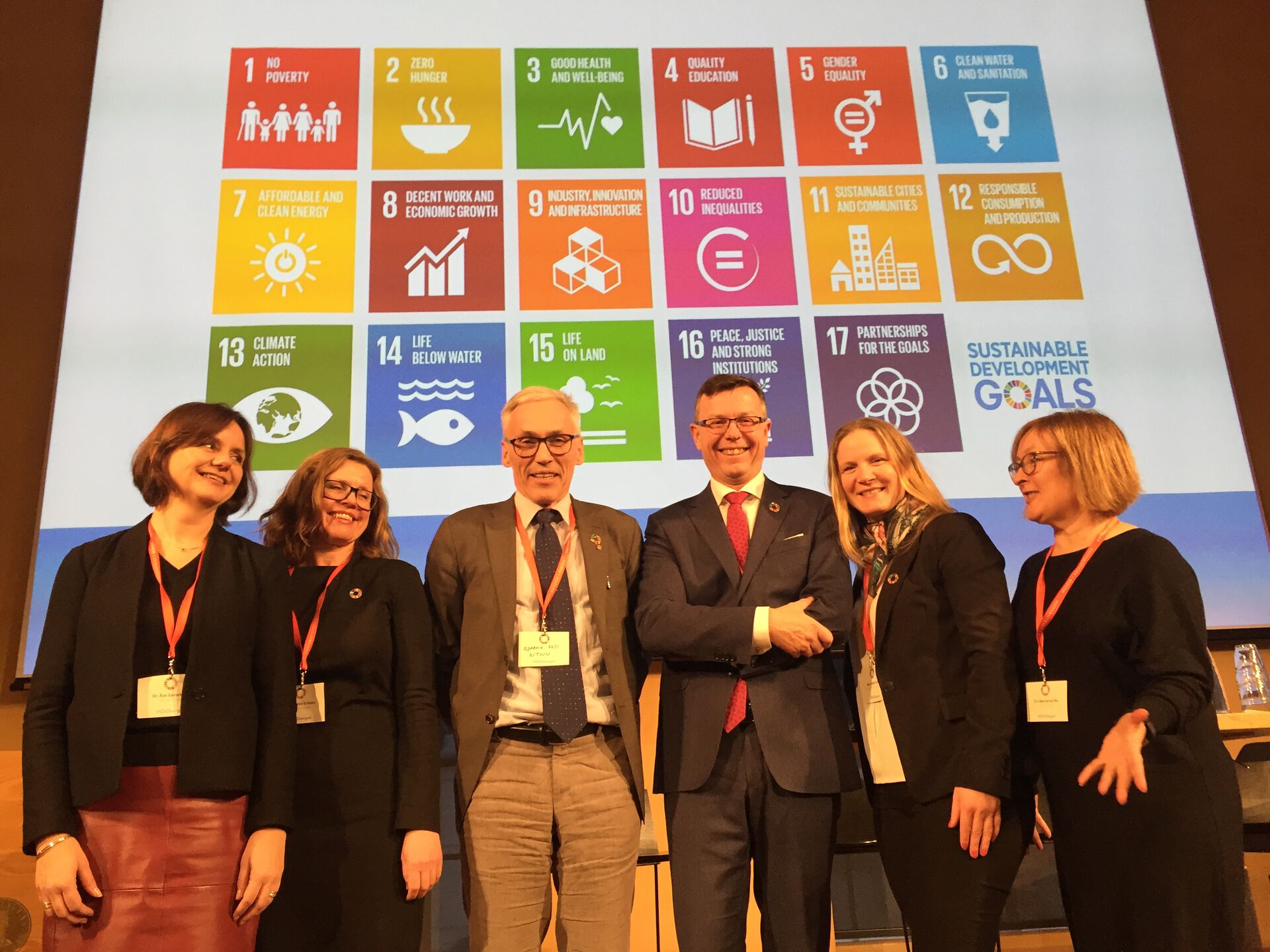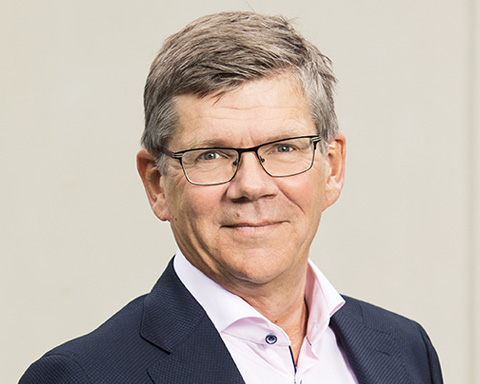
This was one of Vice Rector ?se Gornitzka’s main points when addressing the first SDG Conference for higher education institutions in Bergen last week.

The objective of the conference was to engage Norway’s research and higher education communities, politicians, government officials, NGOs and industry in a discussion on how universities can contribute towards implementation of the SDGs. Several researchers, students and staff from UiO participated at the two-day conference.
Prominent members of the Government were also present. Prime Minister Erna Solberg, Research and Higher Education Minister Iselin Nyb?, and International Development Minister Nikolai Astrup all highlighted the importance of education and of universities in achieving the SDGs. Minister Astrup finished off with three main points: 1. Knowledge is the new global currency. 2. Good research can help policy makers make good decisions. 3. Communication is key, knowledge needs to be transferred.
We totally agree that knowledge on and for sustainable development is key – this is a clear case of where universities can make a difference through research , education and through a knowledge transfer approach.

Several of the panelists at the conference stressed the importance of escaping silos. This is difficult and a real challenge, but it can be done. At UiO we have several successful interdisciplinary initiatives that gather researchers from the humanities, social sciences and the natural sciences. This is precisely because we know that sometimes reforming policy or understanding culture is as important as new technology. So it is not necessary to totally reform universities to be able to meet the SDG challenge. Some seem to think that turning universities upside down or changing the university DNA is a prerequisite for success. We don’t think so. When stepping up the game in working on the SDGs it is important to work with the academic dynamics, not against it, with the researchers doing what they are good at. Our point is that we need to reinforce what is good and support models that are already working. And let’s not forget the strongest impact universities make on the society and the economy: the students and our graduates. Each year approximately 5000 students graduate from UiO with a skill and value set. This is a long term impact on the political system, the economy and civil society. What those skills and values are are in other words not trivial.
When we develop a new strategy for the University of Oslo this fall the SDGs will be a main frame of reference. But, at the core of this strategy we will seek to strengthen the ties between research and education. This is the real key to success we believe.
We also aim to be even more outward looking through better and more cooperation with businesses and societies.

But local initiatives are already being made at UiO. In order to address and contribute to the 2030 Agenda, the Centre for Development and the Environment has established the Oslo SDG Initiative, directed by Professor Dan Banik. In addition to meeting the demand for SDG-related education, it will play a key role in informing policymaking through evidence-based research, as well as facilitating cross-sectoral dialogue and partnerships for the implementation of the 2030 Agenda. Thus, the Oslo SDG Initiative will serve as a hub for education, research, outreach and dissemination related to the Sustainable Development Goals.
Universities can contribute in many ways. And we are.
The Ministry of Education has challenged higher education institutions in Norway to contribute to solving goal number 4 – Quality Education. But why stop there?
The SDGs have a holistic approach to development. Offering such integrated approaches is precisely what strong broad-based universities can contribute with. One discipline cannot solve the great societal challenges of today. Interdisciplinary and cooperation across sectors, institutions and countries is crucial when carving out answers and solutions.
Take goal number 7: Affordable and clean energy. We are convinced that this cannot be solved without the contribution of dedicated researchers within the natural sciences, but also within the social sciences. Because a solution on how to make energy affordable might be found in policy, not only in technology.
And let’s take a look at goal number 16: Peace, justice and strong institutions. Unless our higher education institution educates high quality judges, diplomats, bureaucrats, it would be impossible to achieve this goal. Good governance is a goal in itself and a prerequisite for working effectively towards the full panoply of SDGs. How do you achieve goal number 10: Reduced inequality in a state with weak institutions and corrupt judges?
Just to illustrate, integration between the goals and the overarching governance mechanisms will be one of the areas that the University of Oslo will prioritize.
Whilst interdisciplinarity is important, cooperation between counties is also key. The academy is global per definition and we are excellently positioned for this. The SDG agenda is one of the key topics when we meet with partners in our European university network The Guild. The SDGs will guide the development of the new European research program FP9. This is no small thing! It is the world’s largest research fund.
We all agree that a holistic approach is useful. But, it is a risk that we overlook the concrete and local initiatives that we should also take. The University of Oslo is the size of a medium sized Norwegian city. So how we manage it makes a difference. Recycling projects, (Norwegian) green investments, and strict, green building standards are all important. And we are proud to say that we are making progress here.
But an under-estimated area that can contribute greatly to the SDGs is how universities use its purchasing power. UiO purchases for NOK 2, 6 billion annually! We are working hard to make sure that the money we spend goes to suppliers that act sustainably and fair – but we need to do more. We have calculated that 60 percent of our climate footprint can be traced back to what we purchase. Using our purchasing power we can demand change in how products are made and how people are treated in supplier businesses.

------------------------------------------------------------------------------------------
The Prime Minister’s remarks can be read here. The Minister of International Development’s remarks can be read here. And the conference can be watched in full here.
Facts about the Sustainable Development Goals (SDGs)
- The UN has defined 17 Sustainable Development Goals (SDGs) and 169 subgoals.
- The SDGs cover the period 2015-2030 and are part of the UN's Agenda 2030.
- The main idea behind the goals is to create sustainable development that safeguards the needs of the people living today while ensuring future generations opportunities to meet future needs.
Read more about the SDGs here.



As I understand you, you don't belive in decentralized science based on open science model. Is that correct? In that case then you can see the result of centralized big science research has a much lower rate of replication. See: "Centralized "big science" communities more likely generate non-replicable results" by Valentin Danchev.?https://arxiv.org/abs/1801.05042
?
Universities are in a similar situation as a vehicle workshop that has to adjust from reparing diesel cars to reparing electric cars. The old workers with lots of years experience with dieselmotors have to start learning to repare electric cars on par with the younsters. They have no choise because if they don’t do that they will go out of business.
The university professors on the other side may not ned to adjust to open science?if they can convince the research funders that they can continue more or less like before. The money comes into the budget next years anyway. The traditional professors can decide that the knowledge in "old car reparement" should be the standard they are evaluated against. Until the funders understand that this does'nt fix their electric cars. Sarewitz has written a good article with the title "Saving science"??https://www.thenewatlantis.com/publications/saving-science
?
Kommentering p? dette dokumentet er skrudd av.